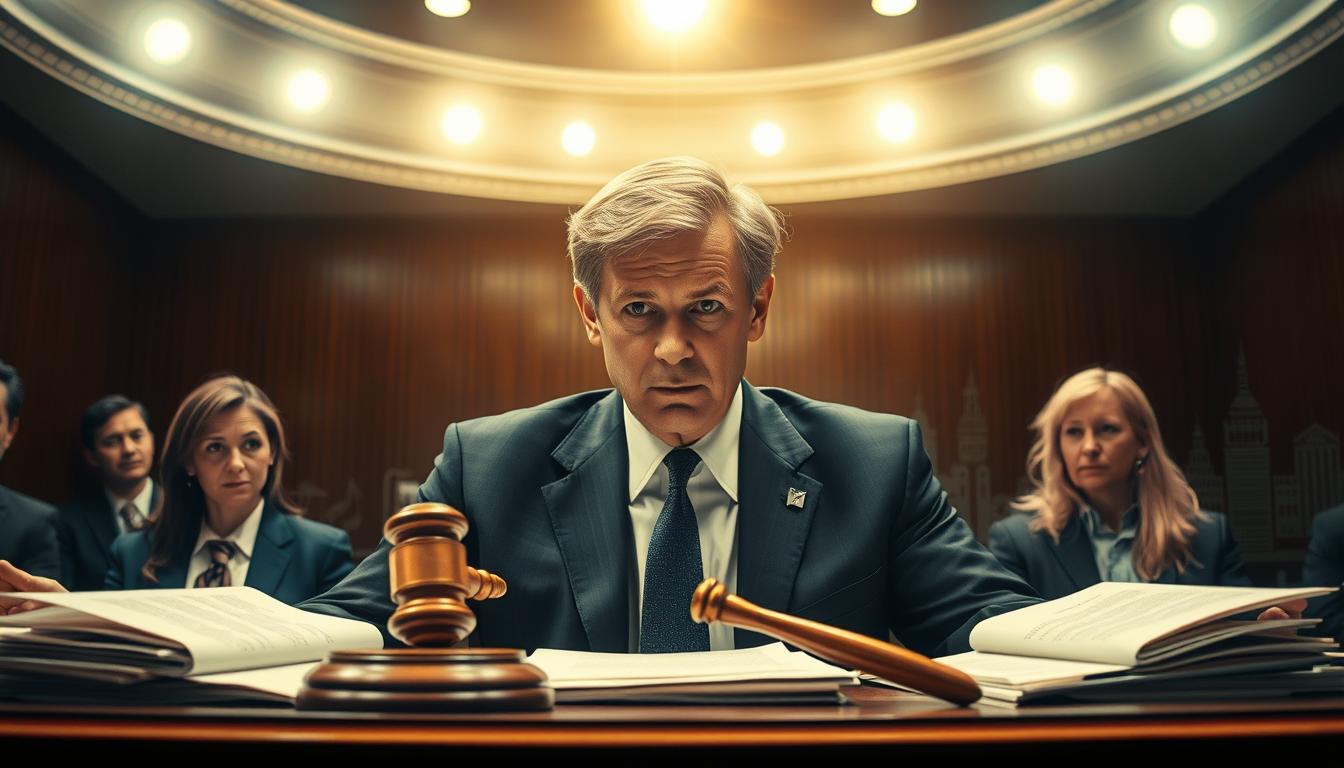Tesla has taken legal action against a former engineer for allegedly stealing its supercomputers' secrets. The engineer reportedly downloaded confidential information related to Tesla's supercomputer project, Dojo, onto personal devices. Additionally, the individual is accused of creating documents containing classified details, transferring information through personal emails, and using a decoy laptop to conceal the theft. Tesla is seeking compensatory damages and the return of the stolen data. This lawsuit underscores the importance of safeguarding proprietary information and the potential consequences of breaching non-disclosure agreements. Details of the case highlight the severity of the situation and its implications for Tesla's technological advancements.
Key Takeaways
- Former Tesla engineer accused of stealing Dojo supercomputer secrets.
- Allegations include unauthorized data transfer to personal devices.
- Breach of non-disclosure agreement and theft of confidential information.
- Lawsuit filed by Tesla for compensatory damages and return of stolen data.
- Engineer used a decoy laptop to conceal possession of trade secrets.
Allegations Against Former Tesla Engineer
The allegations against the former Tesla engineer involve downloading confidential information related to Tesla's supercomputer project, Dojo. Alexander Yatskov, the said engineer, admitted to storing classified information on personal devices and creating documents containing confidential details. Additionally, he reportedly sent emails with classified information from his personal to work email and even provided a decoy laptop in an attempt to conceal evidence.
Yatskov's actions led to his placement on administrative leave on April 6th, and he subsequently resigned from his position on May 2nd after Tesla confronted him about storing information on personal devices. As a result of this breach of confidentiality, Tesla has taken legal action against Yatskov, suing him for compensatory and exemplary damages while also seeking a court order for the return of the stolen information.
The former engineer's actions have raised serious concerns about the protection of Tesla's intellectual property and the security measures in place to safeguard sensitive company information.
Theft of Tesla Supercomputer Secrets

Allegations against former Tesla engineer Alexander Yatskov for stealing confidential information related to Tesla's supercomputer project, Dojo, have sparked legal action and raised concerns about intellectual property protection. Yatskov's actions have significant implications for Tesla, given the sensitive nature of the stolen data and the potential impact on the advancement of their self-driving technology. The alleged theft of Tesla's supercomputer secrets by Yatskov has led to a series of legal challenges and investigations, shedding light on the importance of safeguarding intellectual property in the technology sector.
- Yatskov's unauthorized download of classified information onto personal devices poses a serious threat to Tesla's proprietary technology.
- The creation of documents containing confidential details and the use of a decoy laptop by Yatskov have raised questions about the extent of the security breach.
- Project Dojo's objectives, including training neural networks with real-world camera data from vehicles, are at risk due to the stolen information.
- Tesla's pursuit of compensatory damages and the return of stolen data through legal channels underscores the severity of the situation.
Breach of Non-Disclosure Agreement
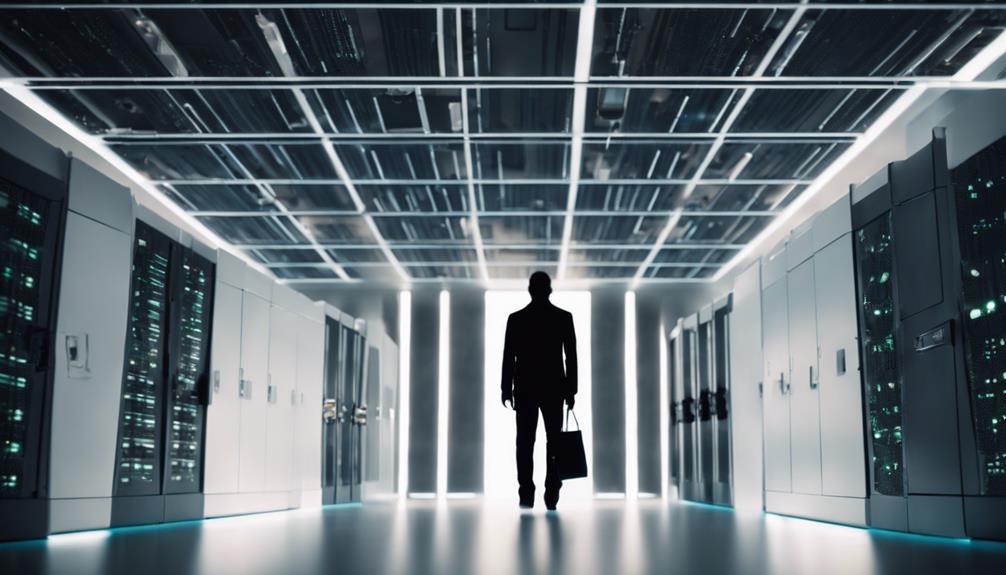
Accused of breaching Tesla's non-disclosure agreement, the former engineer faces legal consequences for transferring confidential information to personal devices. This violation of the agreement, which safeguards Tesla's proprietary information, is a serious matter. By moving such sensitive data to personal devices, the engineer jeopardized Tesla's intellectual property rights and potentially compromised the company's competitive advantage. Additionally, the engineer's attempt to cover his tracks by using a dummy laptop raises further concerns about the extent of the breach and the deliberate nature of his actions.
The unauthorized transfer of information to personal devices not only violates the trust placed in the engineer but also raises questions about his intentions and loyalty to the company. Tesla, rightfully so, is seeking compensatory and exemplary damages to address the breach of the non-disclosure agreement and the potential harm caused by the mishandling of confidential information. Such breaches highlight the importance of upholding non-disclosure agreements to protect valuable company assets and maintain trust within the organization.
Falsification of Experience on Resume

Moving from the breach of the non-disclosure agreement, the focus now shifts to the misrepresentation of experience on the former engineer's resume, an essential aspect in the unfolding legal battle between Tesla and the accused individual. Falsifying experience on a resume can have severe consequences, especially when it involves gaining access to confidential information, as alleged in this case.
The accuracy of information provided on a resume is vital, not only for ethical reasons but also for legal compliance. Here are some key points to ponder regarding the falsification of experience on a resume:
- Misrepresenting qualifications can lead to legal disputes and damage professional reputation.
- Falsifying experience to gain access to confidential information is unethical and potentially illegal.
- Accurate representation of skills and qualifications is crucial for upholding trust and integrity in professional environments.
- The lawsuit filed by Tesla underscores the importance of truthful information on resumes to prevent unauthorized access to sensitive data.
Details of the Lawsuit Filed
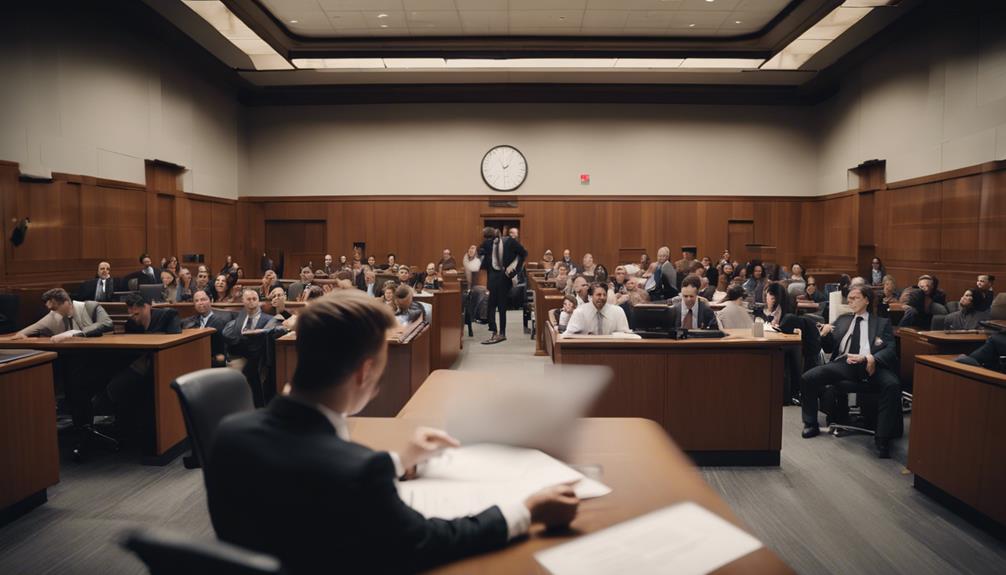
Tesla's lawsuit against former engineer Alexander Yatskov centers around allegations of stealing trade secrets essential to the Dojo supercomputer project.
The lawsuit claims that Yatskov not only downloaded confidential information but also transmitted classified details through personal email accounts.
These accusations could have significant implications for Tesla's technological advancements and intellectual property protection.
Alleged Theft Accusations
The lawsuit filed by Tesla against former engineer Alexander Yatskov details the alleged theft of confidential information related to its supercomputer project. Yatskov is accused of downloading classified data, creating documents with proprietary details, and sending emails containing sensitive information. Tesla claims that Yatskov admitted to storing this information on personal devices and refused to return it. Additionally, Yatskov allegedly provided a decoy laptop to hide evidence of the stolen data.
These accusations of theft have prompted Tesla to seek compensatory damages and a court order for the return of the stolen proprietary information. The lawsuit highlights the seriousness with which Tesla is approaching the alleged theft of its supercomputer secrets by a former employee. Such actions could have significant legal implications for Yatskov and potentially impact Tesla's ongoing projects and intellectual property protection measures.
Potential Impact on Tesla
Filing a lawsuit against former engineer Alexander Yatskov for stealing confidential information related to its supercomputer project, Tesla aims to prevent the dissemination of trade secrets and seek compensatory and exemplary damages.
The potential impact of the stolen information on Tesla could be significant, as it may compromise the company's competitive edge in the development of advanced technologies. If Yatskov were to share or use this classified data for personal gain or to benefit a competitor, Tesla could face severe consequences, including financial losses, damage to its reputation, and setbacks in its technological advancements.
By taking legal action against Yatskov, Tesla demonstrates its commitment to protecting its intellectual property and maintaining the confidentiality of its research and development efforts. The outcome of this lawsuit won't only determine the consequences for Yatskov but also set a precedent for safeguarding sensitive information within Tesla and the broader tech industry.
Tesla's swift response to the alleged theft underscores the importance of stringent security measures and the serious repercussions of breaching confidentiality agreements.
Confidential Information Transfer to Personal Devices
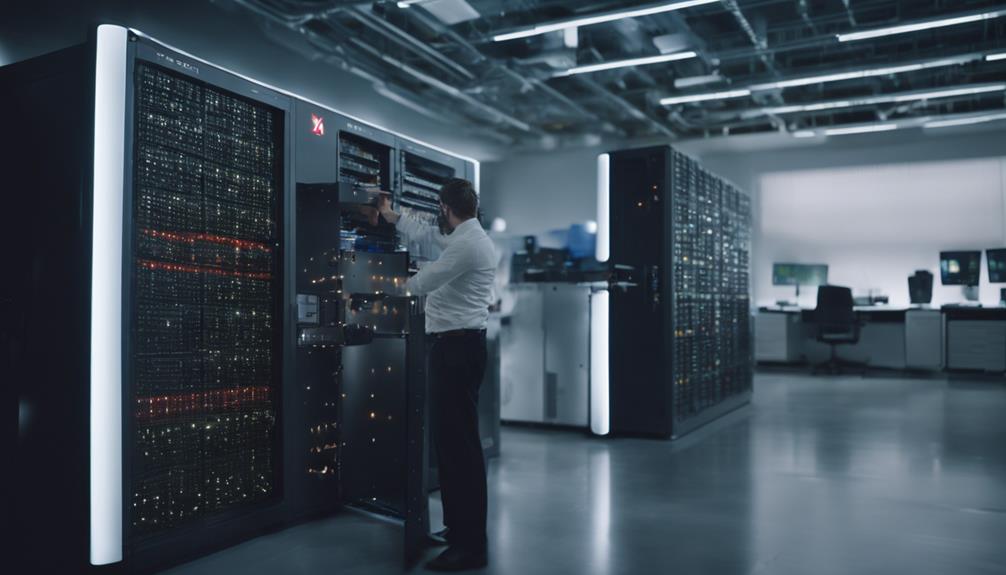
Yatskov's transfer of confidential Tesla data to personal devices constitutes an unauthorized breach of security protocols. This action not only violated Tesla's policies but also potentially compromised sensitive information.
Such unauthorized data transfers can have serious legal and ethical implications, leading to legal actions to protect intellectual property.
Unauthorized Data Transfer
Unauthorized transfer of confidential information to personal devices by a former Tesla engineer has sparked a legal dispute with the company. Alexander Yatskov, the engineer in question, admitted to downloading classified data onto his personal laptop without permission.
Subsequently, Tesla accused Yatskov of both failing to return the stolen information and of generating documents containing sensitive details. In addition, Yatskov allegedly attempted to conceal his actions by providing Tesla with a decoy laptop while keeping the confidential data in his possession. This breach of security involved the transfer of trade secrets related to Tesla's supercomputer project, exacerbating the legal complications between Yatskov and the company.
The unauthorized data transfer highlights the critical importance of safeguarding proprietary information and the severe consequences that can arise from mishandling such confidential data.
Breach of Security
The illicit transfer of confidential information to personal devices by former Tesla engineer Alexander Yatskov has raised significant concerns about security breaches within the company. Yatskov's admission to downloading classified data related to Tesla's supercomputer project onto his personal computer represents a clear breach of security protocols.
Tesla has accused Yatskov of violating company policies by storing proprietary information on personal devices, highlighting the risks associated with the illicit transfer of trade secrets. Yatskov's resignation from Tesla in May, following the confrontation about transferring confidential data to personal devices, underscores the severity of the situation.
The lawsuit against Yatskov serves as a stark reminder of the importance of safeguarding sensitive information and preventing unauthorized access to company data. The breach of security protocols and the unauthorized transfer of confidential information to personal devices underscore the critical need for stringent security measures to protect proprietary data from potential threats and unauthorized disclosures.
Attempt to Cover Tracks With Dummy Laptop
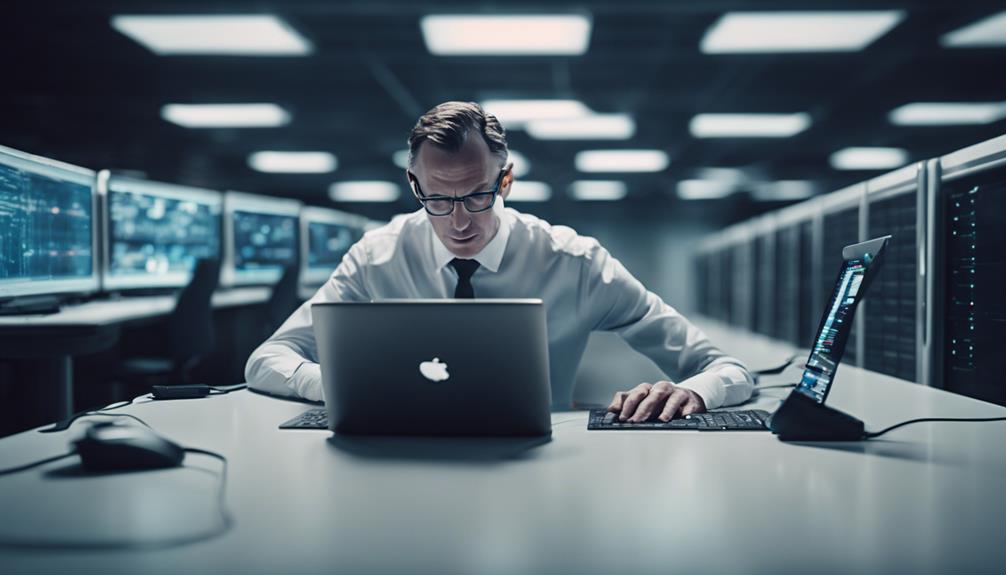
In an attempt to conceal evidence of the stolen confidential information, the former engineer accused of stealing Tesla's supercomputer secrets, Alexander Yatskov, utilized a dummy laptop. The use of this decoy device was a deliberate effort to hide the illicit retention of trade secrets.
This tactic was employed to deceive Tesla and cover up the alleged theft. The presence of the dummy laptop underscores the seriousness of the situation, indicating a premeditated plan to mask the unauthorized possession of Tesla's proprietary information.
- The former engineer, Alexander Yatskov, used a dummy laptop to hide the stolen confidential data.
- The decoy laptop was part of a deliberate attempt to deceive Tesla.
- The presence of the dummy laptop suggests a calculated effort to conceal the illicit retention of trade secrets.
- This tactic highlights the severity of the alleged theft of Tesla's supercomputer secrets.
Importance of Protecting Innovative Technologies
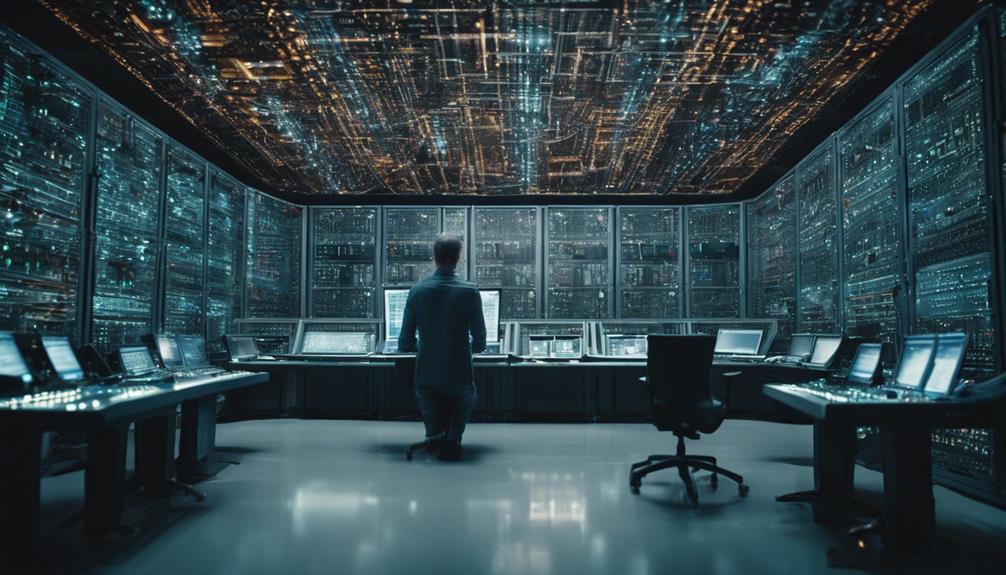
Protecting innovative technologies is vital for companies like Tesla to maintain their competitive edge and drive progress in industries such as autonomous driving technology. Legal safeguards are essential to prevent tech theft risks and guarantee the security of valuable intellectual property.
Implementing robust innovation security measures is necessary to safeguard trade secrets and deter unethical behavior that could compromise cutting-edge projects.
Tech Theft Risks
Highlighting the risks of tech theft, safeguarding innovative technologies such as Tesla's supercomputer project is essential to maintain a competitive edge in the industry. Unauthorized disclosure of trade secrets, particularly those related to the supercomputer project, can result in severe consequences for companies like financial losses, reputational damage, and legal repercussions.
To mitigate these risks, organizations must prioritize protecting their proprietary data through robust security measures and legal actions when necessary. The recent lawsuit filed by Tesla against a former engineer accused of stealing its supercomputer project secrets underscores the critical importance of implementing stringent safeguards to prevent the misuse and unauthorized sharing of valuable intellectual property.
Companies in the tech sector must remain vigilant in guarding their sensitive technological information to prevent unauthorized access and potential theft that could compromise their competitive position in the market.
Legal Safeguards Needed
Legal safeguards play a pivotal role in securing innovative technologies like Tesla's supercomputers. Tesla's recent lawsuit against a former engineer for allegedly stealing its supercomputers' secrets underscores the critical need for companies to protect their trade secrets through legal means.
Theft of proprietary information can have severe repercussions, hindering a company's technological advancements and potentially leading to significant financial losses. In high-tech industries like the one Tesla operates in, safeguarding trade secrets through legal actions is essential to maintain a competitive edge and preserve intellectual property rights.
The legal actions taken by Tesla in response to the alleged theft set a precedent for the protection of intellectual property within the tech sector. Companies operating in innovative fields face ongoing challenges in ensuring the security of their technologies from potential theft, highlighting the importance of robust legal safeguards to prevent unauthorized access to valuable trade secrets.
Innovation Security Measures
In safeguarding their innovative technologies, companies like Tesla must prioritize robust security measures to prevent unauthorized access to valuable trade secrets. When it comes to protecting intellectual property, firms need to implement stringent measures to maintain their competitive advantage and guarantee the sustainability of cutting-edge advancements.
The importance of safeguarding confidential information can't be overstated, as unauthorized disclosure can jeopardize years of dedicated research and development efforts. Legal actions taken against individuals involved in intellectual property theft serve as a critical deterrent, signaling the severe consequences of compromising trade secrets.
Overview of Tesla's Dojo Supercomputer Project
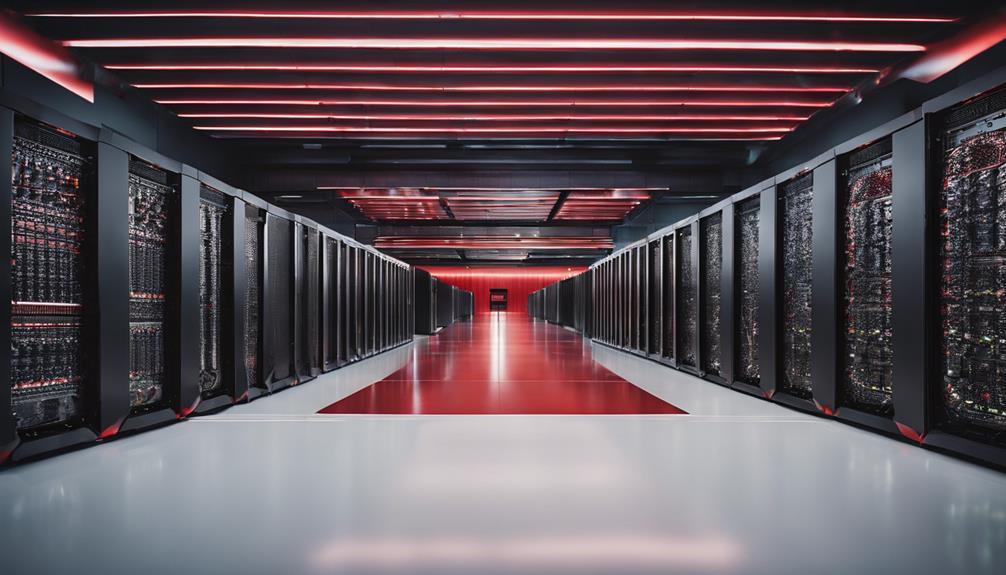
Tesla's Dojo Supercomputer Project is revolutionizing self-driving technology through its advanced neural network training capabilities using the powerful D1 chip. Project Dojo, spearheaded by Tesla, is a cutting-edge supercomputer tailored for training neural networks in self-driving technology.
This project leverages the D1 chip to efficiently manage machine learning workloads, with a planned setup boasting 1.1 exaflops of AI compute power facilitated by 3,000 D1 chips. The training data for Dojo's neural networks is sourced from real-world camera footage captured by Tesla vehicles, enabling the system to learn from diverse driving scenarios.
Engineer Alexander Yatskov played a pivotal role in the development of Project Dojo, contributing to its sophisticated architecture aimed at enhancing Tesla's autonomous driving technology. By enhancing the capabilities of Autopilot through advanced AI training, Tesla's Dojo Supercomputer Project represents a significant leap forward in the domain of self-driving vehicles.
Aim to Revolutionize Autonomous Driving

With the aim of transforming autonomous driving technology, Project Dojo by Tesla pioneers a groundbreaking approach to neural network training. This innovative project, led by thermal engineer Alexander Yatskov, aims to revolutionize the way autonomous vehicles operate by utilizing cutting-edge technology and advanced neural network training methods.
The system boasts an impressive 1.8 exaflops of performance and 10 petabytes of NVME storage, designed to analyze vast amounts of vehicle data to enhance the capabilities of self-driving cars. Key points to ponder regarding Project Dojo's aim to revolutionize autonomous driving include:
- Implementation of state-of-the-art neural network training techniques.
- Focus on enhancing the safety and efficiency of autonomous vehicles.
- Utilization of real-world data from eight cameras within Tesla vehicles.
- Adherence to strict protocols to protect valuable trade secrets related to autonomous driving technology.
Through these innovative approaches, Project Dojo stands at the forefront of revolutionizing autonomous driving, with early successes already demonstrating its potential to transform the industry.
Advanced AI Analysis of Vehicle Data

Project Dojo's cutting-edge AI technology is revolutionizing autonomous driving through advanced data analysis. With its impressive 1.8 exaflops of performance and 10 petabytes of NVME storage, this advanced AI not only processes vast amounts of vehicle data efficiently but also safeguards the security of sensitive information vital for Tesla's success in the autonomous driving sector. The significance of AI in vehicle technology lies in its ability to analyze data effectively, enhancing safety and driving experiences for users worldwide.
AI in Vehicle Technology
Utilizing advanced AI technology, vehicle data is meticulously analyzed to enhance autonomous driving capabilities in Tesla's supercomputer project, Dojo. This cutting-edge system revolutionizes the automotive industry with its remarkable performance features and innovative approach to data analysis. Key points to contemplate regarding AI in vehicle technology include:
- Impressive Performance: Dojo boasts a processing power of 1.8 exaflops and 10 petabytes of NVME storage, enabling rapid analysis of vast amounts of data.
- Training Method: The system leverages video data captured by eight cameras installed in Tesla vehicles to train itself, continuously improving its autonomous driving algorithms.
- Scalability: Dojo's scalability allows it to excel in various environments, adapting seamlessly to both sparsely populated rural areas and densely populated urban settings.
- Safety Enhancements: Early successes of Dojo include the identification of new traffic warnings and advancements in collision detection, enhancing the overall safety features of Tesla vehicles.
Data Analysis Importance
Advanced AI analysis of vehicle data plays a pivotal role in enhancing autonomous driving technology by enabling real-time processing of vast amounts of driving data. Tesla's Project Dojo leverages advanced AI capabilities to analyze data collected from Tesla vehicles, utilizing 1.8 exaflops of performance to dissect real-world driving scenarios.
By harnessing data from eight onboard cameras, Tesla's Dojo project trains neural networks for self-driving, allowing the system to adapt to diverse driving conditions. This data analysis is vital for enhancing autonomous driving systems, as it enables the vehicles to learn from and respond to complex environments effectively.
The AI capabilities embedded in Dojo empower Tesla to process and understand the immense volume of data generated during driving, ultimately contributing to the development of safer and more efficient autonomous driving technology. The continuous refinement of data analysis techniques is essential for the advancement of autonomous driving, ensuring that vehicles can navigate various situations with precision and reliability.
Security of Information
The protection of sensitive information in advanced AI analysis of vehicle data becomes paramount to safeguard against potential security breaches.
- Encryption Measures: Implementing robust encryption protocols guarantees that data is secure during transmission and storage.
- Access Control Policies: Restricting access to confidential information only to authorized personnel minimizes the risk of unauthorized exposure.
- Regular Security Audits: Conducting frequent security audits helps identify vulnerabilities and ensures compliance with best practices.
- Employee Training Programs: Educating employees on the importance of safeguarding trade secrets and confidential data enhances awareness and reduces the likelihood of breaches.
Legal Implications for the Ex-Employee

Legal implications for the ex-employee in the Tesla lawsuit include facing potential penalties for the alleged theft of trade secrets related to the company's supercomputer project. The ex-employee is accused of illicitly retaining trade secrets by downloading confidential information to personal devices without authorization. In addition, the breach of a non-disclosure agreement and misrepresentation of experience on their resume have exacerbated the situation. Tesla's legal actions aim to prevent the dissemination of its proprietary information and seek compensatory damages for the alleged theft. These actions highlight the seriousness with which companies like Tesla view the protection of their intellectual property. Below is a table summarizing the key legal implications for the ex-employee:
| Legal Implications | Details |
|---|---|
| Illicit Retention of Trade Secrets | Downloading confidential information without authorization. |
| Non-Disclosure Agreement | Alleged breach of the agreement and misrepresentation on the resume. |
| Compensatory Damages | Legal actions seek compensation for the alleged theft of trade secrets. |
Impact on Tesla's Intellectual Property Protection
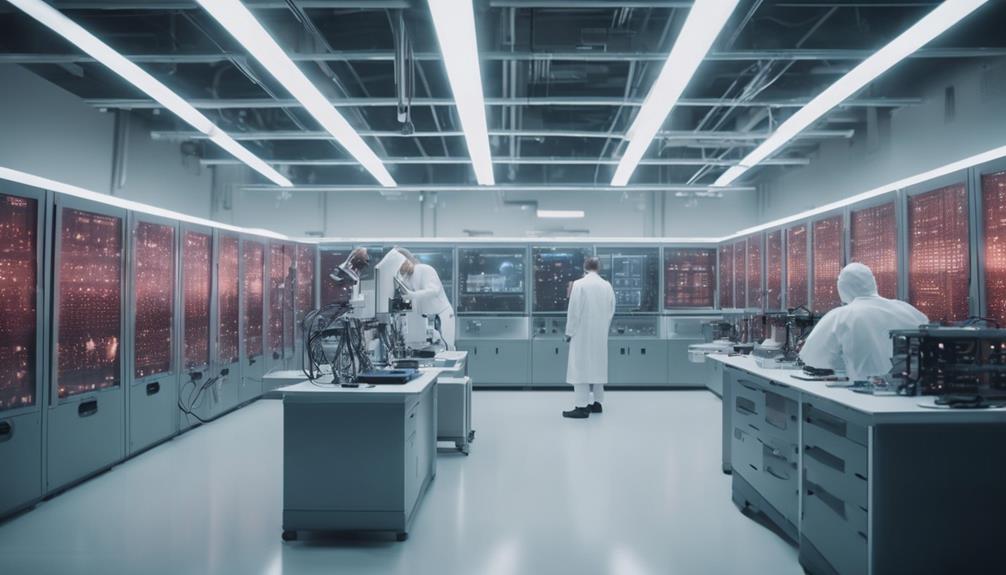
How does Tesla's lawsuit against the former engineer reinforce the importance of safeguarding intellectual property in high-tech industries?
The legal action taken by Tesla underscores the critical need for companies to protect their intellectual property from potential theft and misuse. In this case, the lawsuit aims to prevent the unauthorized disclosure of confidential information related to Tesla's supercomputer project, highlighting the detrimental impact of trade secret theft on business operations and technological advancements.
By pursuing legal recourse against individuals who breach non-disclosure agreements, Tesla sets a precedent for robust intellectual property protection within the high-tech sector. The company's history of litigating against former employees accused of stealing proprietary information further demonstrates its commitment to upholding the integrity of its technological innovations.
This case serves as a reminder for companies to implement stringent measures to safeguard their trade secrets and reinforce the significance of maintaining thorough intellectual property protection protocols.
Significance of Maintaining Trade Secrets
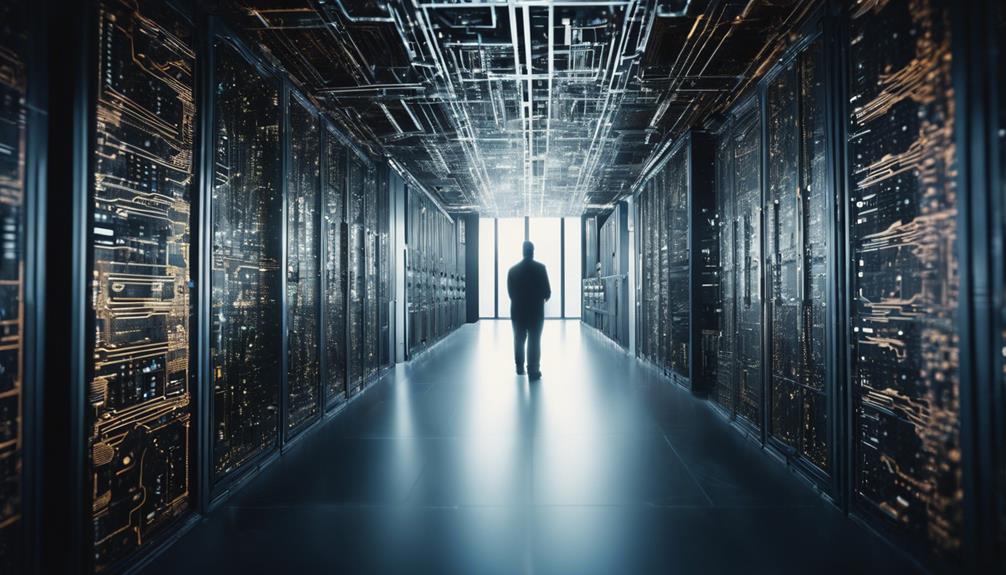
Safeguarding trade secrets is crucial for companies looking to maintain a competitive edge and protect their valuable information from unauthorized access. Trade secrets encompass confidential information that provides organizations with a distinct advantage in the market, such as unique manufacturing processes or customer data. By securing these trade secrets, companies guarantee that their intellectual property remains secure and inaccessible to competitors, safeguarding their technological innovations and business strategies. Unauthorized disclosure of trade secrets can lead to substantial financial losses and reputational damage, underscoring the critical importance of maintaining confidentiality.
Companies invest significant resources in protecting their trade secrets through various security measures, including restricted access, non-disclosure agreements, and cybersecurity protocols. Legal actions, such as Tesla's lawsuit against the former engineer accused of stealing its supercomputers' secrets, serve as a deterrent to potential intellectual property theft and highlight the significance of respecting confidential information. Preserving trade secrets is paramount for companies aiming to safeguard their competitive position and preserve their valuable intellectual property.
Conclusion and Future Implications

As the tech industry grapples with the repercussions of trade secret theft, Tesla's lawsuit against the former engineer sheds light on the gravity of such illicit actions. The implications of this case extend beyond the immediate legal battle, touching on broader concerns and future ramifications:
- Impact on Innovation: Trade secret theft jeopardizes the competitive edge that companies like Tesla invest heavily in, hindering technological advancements.
- Trust and Security: Incidents like these raise questions about the integrity of proprietary information within organizations and the measures needed to safeguard it.
- Legal Precedent: The outcome of this lawsuit could set a precedent for how the industry handles similar cases in the future.
- Elon Musk's Vision: Elon Musk's involvement in projects like Dojo underscores Tesla's dedication to pushing the boundaries of AI and supercomputing for autonomous driving, emphasizing the importance of protecting intellectual property for continued progress.
Frequently Asked Questions
Has Anyone Won a Lawsuit Against Tesla?
No, as of the current information available, no one has won a lawsuit against Tesla regarding theft of its corporate data or trade secrets.
Tesla has a history of successfully defending its intellectual property through legal action, prevailing in cases like those involving Alex Khatilov and Cao Guangzhi.
The company's proactive stance against intellectual property theft has been evident in various legal disputes, showcasing its commitment to protecting proprietary technology.
What Is Tesla Dojo Technology?
Tesla's Dojo technology is a cutting-edge supercomputer tailored for training neural networks, especially for self-driving software. It leverages the D1 chip to efficiently handle machine learning tasks, aiming for an impressive 1.1 exaflops of AI compute power with 3,000 D1 chips.
Real-world camera data from Tesla vehicles drives Dojo's neural network training, enhancing the company's autonomous driving technology through advanced AI training methods.
What Is a Project Dojo?
Project Dojo symbolizes Tesla's advanced supercomputer endeavor for training self-driving tech neural networks. It leverages the D1 chip to achieve 1.1 exaflops of AI compute, employing 3,000 D1 chips.
This initiative aims to bolster Tesla's autonomous driving capabilities through cutting-edge AI training. The project encompasses top-secret data essential for autonomous driving innovation, now at the center of legal actions due to Yatskov's alleged mishandling of classified information.
Conclusion
To sum up, the lawsuit filed by Tesla against its former engineer for allegedly stealing supercomputer secrets highlights the significance of safeguarding intellectual property.
While some may argue that such legal actions are excessive, protecting trade secrets is essential for innovation and competitiveness in the tech industry.
By holding individuals accountable for breaches of confidentiality agreements, companies like Tesla can maintain their technological edge and uphold the integrity of their proprietary information.









